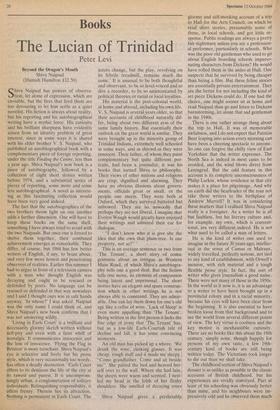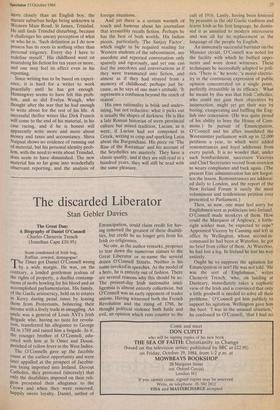Books
The Lucian of Trinidad
Peter Levi
Beyond the Dragon's Mouth Shiva Naipaul (Hamish Hamilton £12.50)
Shiva Naipaul has powers of observa- tion, let alone of expression, which are enviable, but the fires that feed them are too devouring to let him settle as a quiet novelist. His fiction is always about reality, but his reporting and his autobiographical writing have a mythic force. His curiosity and his brilliant sharpness have evidently arisen from an identity problem of great interest, since in some ways it is shared with his elder brother V. S. Naipaul, who published an autobiographical book with a complementary piece of foreign reporting, under the title Finding the Centre, less than a year ago. Shiva Naipaul's new book is a piece of autobiography, followed by a collection of eight short stories written before 1974, and a substantial series of pieces of reporting, some more and some less autobiographical. A novel as interest- ing as this fascinating collection would have been very good indeed.
The fact that the autobiographies of the two brothers throw light on one another adds a further dimension. One will have to keep these books on the same shelf, something I have always tried to avoid with the two Naipauls. But once one is forced to shelve them together, their combined achievement emerges as remarkable. They differ, of course, but 1984 has few better writers of English, if any, to boast about, and very few more honest and penetrating observers of realities. Earlier this summer I had to argue in front of a television camera with a man who thought English was decaying and ought to be rescued or defended by poets. No language can be rescued or defended in that way nowadays and I said I thought ours was in safe hands anyway. 'In whose?' I was asked. Naipaul was the only name I could think of, and Shiva Naipaul's new book confirms that I was not answering wildly.
'Living in Earls Court' is a brilliant and necessarily gloomy sketch written without self-pity and even with a faint whiff of nostalgia. It communicates innocence and the loss of innocence. 'Flying the Flag in Brixton' is more trenchant. Shiva Naipaul's eye is selective and lively but his prose style. which is very occasionally too wordy, has often a deadly distinction. 'Earls Court offers to its denizens the life of the city at its rawest and purest. It is uncomprom- isingly urban, a conglomeration of solitary individuals. Relinquishing responsibility, it offers frenzy. Therein lies its attraction. Nothing is permanent in Earls Court. The actors change, but the play, revolving on its febrile treadmill, remains much the same.' It is unusual to be both thoughtful and observant, to be so level-voiced and so dire a recorder, to be so unintoxicated by political theories or racial or local loyalties.
His material is the post-colonial world, at home and abroad, including his own life. V. S. Naipaul is several years older, so that their accounts of childhood naturally dif- fer, being about two different eras of the same family history. But essentially their outlook on the great world is similar. They were brought up in the minority group of Trinidad Indians, extremely well schooled in some ways, and as shrewd as they were innocent. Their father, of whom they paint complementary but quite different por- traits, had been a journalist; it was his books that turned Shiva to philosophy. Their views of other nations and religions are crisp, dignified and alarming. They have no obvious illusions about govern- ments, officials great or small, or the people one meets. They were both at Oxford, which they survived battered but unbowed. They are so unWoolly that perhaps they are not liberal. I imagine that Evelyn Waugh would greatly have enjoyed their writings and admired their ear for dialogue.
"I don't know who it is give she the idea that she own that plum-tree. Is our property, not so?"'
This is an average sentence or two from 'The Tenant', a short story of comic grimness about an intrigue in Western Main Road, of which Shiva's autobiogra- phy tells one a good deal. But the fiction tells one more, its element of compassion being latent and impersonal. The short stories have an elegant and spare construc- tion which in other writings he is not always able to command. They are admir- able. One can lay them down for one's old age like a cellar of wine. 'Lack of Sleep' is even more appalling than 'The Tenant'. Being written in the first person it lacks the fine edge of irony that 'The Tenant' has; but as a low-life Earls-Courtish tale of decline and fall, it has some convincing moments.
An old man has picked up a whore. 'We drank the wine, clinking glasses. It was cheap, rough stuff and it made me sleepy. "Come grandfather. Come and sit beside me". She patted the bed and heaved her- self over to the wall. Where she had lain, the sheets were warm and scented. I nest- led my head in the folds of her fleshy shoulders. She smelled of decaying roses'
Shiva Naipaul gives a predictably gloomy and self-mocking account of a trip to Hull for the Arts Council, on which he read short stories, presumably some of these, in local schools, and got little re- sponse. Public readings are always a pretty fair nightmare unless you are a profession- al performer, particularly in schools. Who was the poor old gentleman who used to go about English boarding schools imperso- nating characters from Dickens? He would have rolled them in the aisles at Hull. One suspects that he survived by being cheaper than hiring a film. But these feline stories are essentially private entertainment. They are the better for not including the kind of set piece Dickens could do. If one had the choice, one might sooner sit at home and read Naipaul than go and listen to Dickens barnstorming, let alone that sad gentleman in the 1940s.
There is one rather strange thing about the trip to Hull. It was of memorable awfulness, and I do not expect that Patricia Beer leaping into action every morning can have been a cheering spectacle to anyone. So one can forgive the chilly view of East Yorkshire that the writer expresses. The North Sea is indeed in most cases to be avoided, and the wind blows direct from Leningrad. But the odd feature in this account is its complete unconsciousness of Philip Larkin, whose residence in that city makes it a place for pilgrimage. And why on earth did the bearleader of the tour not take these writers to the birthplace of Andrew Marvell? It was in considering these matters that I realised Shiva Naipaul really is a foreigner. As a writer he is all but faultless, but his literary culture and, for example, my own, which is convent- ional, are very different indeed. He is not what used to be called a man of letters.
He is the kind of writer one used to imagine in the future 30 years ago; intellec- tual in the sense of Camus or Malraux, widely travelled, perfectly serious, not tied to any kind of establishment, with Orwell's incision, with rich material and a tough flexible prose style. In fact, the sort of writer who gives journalism a good name. There were not many of those in the 1950s. In the world as it now is, it is an advantage to a writer to have been brought up in a provincial colony and in a racial minority, because his eyes will have been clear from the beginning. It is also essential to have broken loose from that background and to see the world from several different points of view. The key virtue is coolness and the key motive is inexhaustible curiosity. There are no books like this about the 19th century, simply none, though happily for persons of my own taste, a few 19th- century kind of books are still being written today. The Victorians took longer to die out than we shall take.
The childhood section of Shiva Naipaul's dossier is as unlike as possible to the classic accounts of British childhood, but his experiences are vividly conveyed. Part at least of his schooling was obviously better than mine, and his neighbours were im- pressively odd and he observed them much more closely than an English boy, the mature suburban hedge being unknown in Western Main Road, St James, Trinidad. He still finds Trinidad disturbing, because it challenges his uneasy perception of what Or who he is. 'Such definition as I do now Possess has its roots in nothing other than personal exigency. Every day I have to redefine myself.' His childhood went on nourishing his fiction for ten years or more, and one may feel its effect even in his reporting.
Since writing has to be based on experi- ence, it is hard for a writer to work Peacefully until he has got enough. Hemingway seems to have felt this prob- lem, and so did Evelyn Waugh, who thought after the war that he had enough to write about for the rest of his life. A successful thriller writer like Dick Francis Will come to the end of his material, in his case racing, and if he is honest will apparently write more and more about money and taxes and accountancy. Shiva Naipaul shows no evidence of running out of material, but his personal identity prob- lem, with the need to write about Trinidad, does seem to have diminished. The new material has so far gone into wonderfully observant reporting, and the analysis of foreign situations.
And yet there is a certain warmth of touch and humour about his journalism that irresistibly recalls fiction. Perhaps he has the best of both worlds. His Indian pieces, particularly 'The Sanjay Factor', which ought to be required reading for Western students of the subcontinent, use anecdote and reported conversation only sparsely and rigorously, and yet one can feel the anecdotes and conversations as if they were transmuted into fiction, and almost as if they had strayed from a memory of childhood; perhaps just be- cause, as he says of one man's attitude, 'It represents a confusion beyond the reach of reason'.
His own rationality is brisk and undev- iating, but not reductive: what it picks out is usually the shapes of darkness. He is like a late Roman historian of stern provincial culture but mixed tradition, Lucian, as it were, if Lucian had not composed in Greek, writing in crisp and sparkling Latin about the Burgundians. His piece on 'The Rise of the Rastaman' and his account of the Seychelles are masterly. They have a classic quality, and if they are still read in a hundred years, they will still be read with the same pleasure.























































 Previous page
Previous page